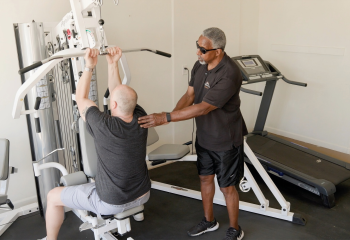More About Rehabs for Nicotine Addiction
As defined, "Nicotine is the primary reinforcing component of tobacco". It's what makes any tobacco product (cigarettes, vapes, snuff, and dip) addictive. You can smoke it, snort it, and chew it, but smoking (and inhaling the smoke) produces the most instant effects.
Nicotine causes a "high" by stimulating the adrenal glands and producing a flood of adrenaline. It also activates reward pathways in your brain to reinforce use and provide pleasure.
The ritual of smoking makes nicotine even more addictive. Just getting, lighting, and holding a cigarette can produce pleasure, especially if it accompanies an activity you already enjoy (like drinking coffee). It can be as hard to stop these rituals as it is smoking. But, it's more than possible to quit.
Risks of Nicotine Addiction
Smoking is the leading cause of preventable death in the United States. The chemicals found in tobacco smoke can cause cancer and damage nearly every organ. Someone who smokes is twice as likely to die from cancer as a nonsmoker, and heavy smokers are 4 times as likely to die from cancer.
Though smoking primarily causes lung cancer, the carcinogenic chemicals can cause cancer in the mouth, stomach, kidney, esophagus, and more. Secondhand smoke can cause cancer too. Even smokeless tobacco can cause cancer.
Smoking can also cause diseases like chronic bronchitis and is the highest risk factor for developing chronic obstructive pulmonary disease (COPD). It also increases your chances of heart disease, rheumatoid arthritis, and impaired immune function.
Quitting smoking allows your body to repair the damage and improves your wellness (except for chronic obstructive pulmonary disease; it's not reversible).
Do Rehabs Treat Nicotine Addiction?
Yes, rehabs treat nicotine addiction. You can attend several levels of care for smoking addiction, including:
- Outpatient, where you meet once or twice a week with others in treatment and your care provider.
- Intensive outpatient, where you meet 3-5 times a week for several hours for more intensive care.
- Partial hospitalization, where you meet 5-7 times a week for a full day or most of one.
- Residential, where you live in a rehab center for 28+ days and engage in treatment with a community of peers and treatment providers.
- Inpatient, where you live in a treatment center or hospital and receive 24/7 monitoring. This level of care is suited for those in acute medical or psychological distress.
In each level of care, you'll likely receive 1-1 therapy with a therapist and group therapy. The exact type of therapies used will vary based on your symptoms, medical history, age, and more. But you can expect to engage in one or more types of evidence-based therapy throughout your treatment.
How Can I Find Support?
- Rehabs for Nicotine
- Telehealth Provider
- Talk to a supportive friend or family member
- Talk to your primary care physician
- National Helplines
What Therapies Are Used to Treat Nicotine Addiction?
- Cognitive Behavioral Therapy (CBT): a form of psychotherapy that encourages you to challenge and change unhelpful thoughts, feelings, and behaviors. It can help you identify triggers and the people and places that make you more likely to smoke.
- Interpersonal Therapy (IPT): a short-term form of psychotherapy that helps you identify and address interpersonal issues that may contribute to your nicotine addiction.
- Dialectical Behavioral Therapy (DBT): an approach that combines elements of CBT and mindfulness to help you become more aware of your thoughts, feelings, and behaviors.
- Mindfulness-Based Therapy: mindfulness-based therapy for nicotine addiction helps you notice the thoughts and emotions leading to cravings or triggers. You'll then learn to tolerate the emotions without using nicotine.
- Medication: Nicotine replacement therapy includes nicotine patches, gum, and suckers to make coming off nicotine more comfortable. For some, medications like bupropion and varenicline help with long-term abstinence too.
Psychiatrists and therapists often use a combination of different therapies depending on the individual patient's needs and unique presentation of nicotine addiction. Psychiatrists may also prescribe medication as an adjunct to therapy. Ultimately, the goal of treatment is to help the patient to develop healthy coping skills and strategies to manage nicotine addiction.
Medications for Nicotine Addiction
Nicotine replacement therapy can help you wean off nicotine and stay abstinent. Patches, gum, or suckers with small amounts of nicotine can help you take less and less rather than stopping all at once. And, nicotine replacement therapies don't contain the many harmful chemicals found in cigarette smoke. When used properly, you can experience less intense withdrawal symptoms and fewer cravings.
Medications like bupropion and varenicline help decrease cravings and the pleasure from smoking, making relapses less likely.
Finding the right fit may take time. Your prescriber may try different doses and medication classes before your symptoms abate. Depending on your situation and symptoms, you may take medications or use nicotine replacement therapy a few months or for a few years.
When talking to your doctor about medications, keep these questions in mind:
- How long will it take for me to feel the medication's effects?
- Will this medication, or class of medications, interact with any supplements or other medications I'm taking?
- What time of day should I take this medication?
- Can I take this on an empty stomach or do I need to eat beforehand?
- What are the most common side effects?
- Does this medication have a Black Box/Boxed warning for an increased risk of suicide? (Your doctor will most likely bring this up right away, but it's good to check.)
- Could this prescription become addictive?
- What will withdrawals look like if we decide to stop this medication and/or try another?
Is It Possible to Experience a Relapse?
Yes, you can relapse with nicotine. You can seek professional treatment to understand and treat the root causes of addiction to prevent future relapses. Most nicotine addiction treatment programs include relapse prevention planning, aftercare, and connections to additional resources, like support groups.
A recurrence doesn't mean your treatment failed. It just means you need additional help to get back into healing.
Can I Use The Family and Medical Leave Act (FMLA) for Nicotine Addiction Treatment in The U.S.?
If you've been clinically diagnosed with nicotine addiction, then you can receive Family and Medical Leave Act support. The FMLA ensures that you do not lose your job when taking necessary time (up to 12 weeks) off to heal from a serious health condition. This act also guarantees that you retain the same terms of employment that you originally had for your job.
What's provided in your FMLA may vary and has requirements for eligibility. Talk with your Human Resources (HR) department at work or look online for more information on FMLAs.
Questions to Ask Your Doctor
Making an appointment with your primary care physician can be your first step into treatment. When you go, you can keep a few questions in mind to optimize your appointment and get the care you need.
- Do my symptoms align with having a nicotine addiction?
- What treatments do you recommend for nicotine addiction?
- What level of care do you think I need?
- Would you describe my addiction as severe?
- Based on how much I smoke and my symptoms, will quitting cause withdrawal symptoms?
- How should I manage withdrawal symptoms?
- Should I try nicotine replacement therapy? If so, which kind?
- Are there any support groups or online resources I could join to manage my addiction?
- Do I have any mental health conditions I should be aware of?



































































































































